

Students’ Approaches to Learning. In 1976, Swedish researchers Ference Marton and Roger Saljö demonstrated that students learn not what teachers think they should learn, but what students perceive the task to demand of them.
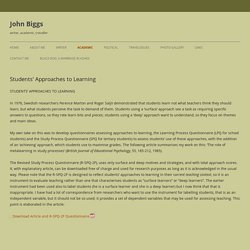
Students using a ‘surface’ approach see a task as requiring specific answers to questions, so they rote learn bits and pieces; students using a ‘deep’ approach want to understand, so they focus on themes and main ideas. My own take on this was to develop questionnaires assessing approaches to learning, the Learning Process Questionnaire (LPQ for school students) and the Study Process Questionnaire (SPQ for tertiary students) to assess students’ use of these approaches, with the addition of an ‘achieving’ approach, which students use to maximise grades. The following article summarises my work on this: ‘The role of metalearning in study processes’ (British Journal of Educational Psychology, 55, 185-212, 1985). Download Article and R-SPQ-2F Questionnaire. Learner Agency, Technology, and Emotional Intelligence.
Preface Early in my training as an educator, I was exposed to William Glasser’s conceptualization of basic human needs and their importance in creating a healthy educational setting.
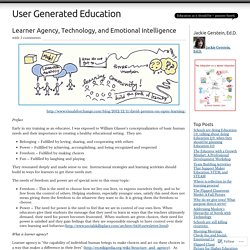
They are: Belonging – Fulfilled by loving, sharing, and cooperating with othersPower – Fulfilled by achieving, accomplishing, and being recognized and respectedFreedom – Fulfilled by making choicesFun – Fulfilled by laughing and playing They resonated deeply and made sense to me. Instructional strategies and learning activities should build in ways for learners to get these needs met. The needs of freedom and power are of special note to this essay/topic: Freedom – This is the need to choose how we live our lives, to express ourselves freely, and to be free from the control of others.
What is learner agency? Schwartz and Okita developed the following table to compare and contrast high versus low agency learning environments. 10 Tips for Developing Student Agency. Agency is the capacity and propensity to take purposeful initiative—the opposite of helplessness.
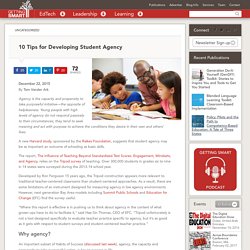
Young people with high levels of agency do not respond passively to their circumstances; they tend to seek meaning and act with purpose to achieve the conditions they desire in their own and others’ lives. A new Harvard study, sponsored by the Raikes Foundation, suggests that student agency may be as important an outcome of schooling as basic skills. The report, The Influence of Teaching Beyond Standardized Test Scores: Engagement, Mindsets, and Agency, relies on the Tripod survey of teaching. Over 300,000 students in grades six to nine in 14 states were surveyed during the 2013-14 school year. Developed by Ron Ferguson 15 years ago, the Tripod construction appears more relevant to traditional teacher-centered classrooms than student-centered approaches.
Why agency? Albert Bandura said: Hitlin and Elder suggest four overlapping conceptions of agency: 10 Guidelines for Teaching More Than Teaching. Student Agency. Student Agency Model — Students With Agency. College students are graduating into a changing and complex economic and political landscape.
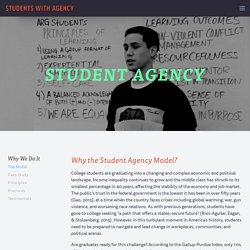
Income inequality continues to grow and the middle class has shrunk to its smallest percentage in 40 years, affecting the stability of the economy and job market. The public’s trust in the federal government is the lowest it has been in over fifty years (Gao, 2015), at a time when the country faces crises including global warming, war, gun violence, and worsening race relations. WestEd’s Student Agency in Assessment & Learning Project. This post is adapted from the Next Generation Learning Challenges‘ Friday Focus.
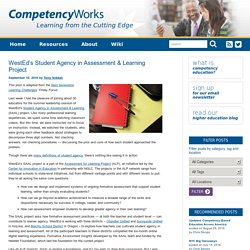
Last week I had the pleasure of joining about 30 educators for the summer leadership session of WestEd’s Student Agency in Assessment & Learning (SAAL) project. Like many professional learning experiences, we spent some time watching classroom videos. But this time, we were instructed not to focus on instruction. Instead, we watched the students, who were giving each other feedback about strategies to decompose three digit numbers. Not checking answers, not checking procedures — discussing the pros and cons of how each student approached the problem. Though there are many definitions of student agency, there’s nothing like seeing it in action. WestEd’s SAAL project is a part of the Assessment for Learning Project (ALP), an initiative led by the Center for Innovation in Education in partnership with NGLC.